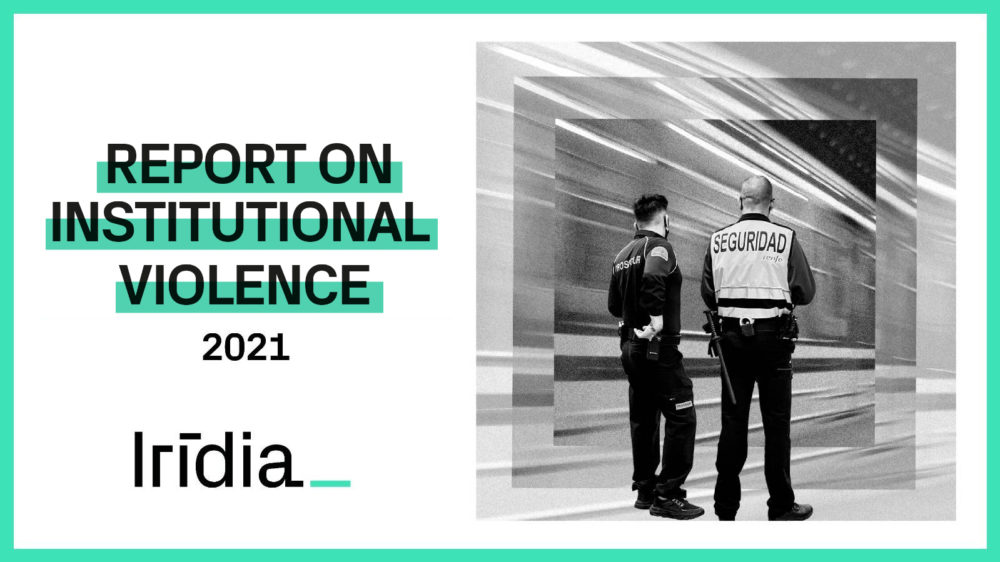Campaign
Report on institutional violence 2021
Goals
Once again, the Report on Institutional Violence 2021 which analyzes the main violations of rights that have been received by the Service for Attention and Complaints in Situations of Institutional Violence (SAIDAVI); which offers free psycho-legal assistance to affected individuals. Throughout 2021, SAIDAVI received a total of 161 requests, of there, 62 cases fell within the Service's remit: 8 of the cases have been taken as legal representantion.

The human rights organization litigated in 68 cases in 2021, for which there are a total of 124 police officers, private security and prison officials investigated.
During 2021, SAIDAVI intervened in a total of 68 cases. Of these, 56 remain ongoing, while 12 were closed over the course of the year. Should be highlighted two convictions: Cal destacar dues condemnes: one to the Mossos d’Esquadra agent who broke the finger of a La Directa journalist; and another to a Guardia Urbana agent for a case of ill-treatment at the police station. It should also be noted that a component of racism has been detected in 19 cases. There are 124 investigated agents for these litigations: 23 from the Mossos d’Esquadra, 83 from the National Police, 5 from the Local Police or the Guardia Urbana, 5 from private security and 8 from prison officials. In addition, a case of torture by the Political-Social Brigade during the Franco regime has been taken over.
This year’s report focuses on the interventions of private security agents, for which 9 complaints have been received. It is worrying the increase in the severity and disproportion of the actions, which in 3 cases included arrests that the Service considers illegal. In total, 6 cases took place in public transport stations and most are discriminatory actions: 5 for racism and 1 for mental health. Available data from 2016 indicate that at that time in Catalonia there were 12,537 active security guards, a figure that is better understood compared to the 16,600 Mossos d’Esquadra agents and the 10,700 local police. These staff perform public functions as they work in outsourced services.
F.B., one of the people cared for by the Service in 2021, presented her case at the presentation of the report: two security guards reprimanded her in a mall when a clerk accused her of stealing some pants. Despite being able to prove that she had not committed any theft with the purchase ticket, the guards followed her as she left the store and searched her, even lifting her T-shirt in public. They then took her to a detention center in the center where she was given racist pushes and comments and left locked up. When the Mossos d’Esquadra arrived, F.B. was suffering from an anxiety attack. However, they detained her for more than an hour while conducting the relevant checks and did not want to collect her complaint for the facts at the same time.
On the other hand, a new case of loss of eye due to the impact of a foam projectile during a demonstration has been assumed this year. There are already 4 litigations represented by Irídia for serious injuries to the head area; in violation of international regulations prohibiting shooting over the abdomen. It has also been reported that the Department of the Interior allows SIR-X projectiles, the most harmful type, to be fired at a distance of 20m, although the manufacturer advises not to shoot it within 30m.
In all, the entity’s Psychosocial Area has carried out 236 interventions. It is clear, once again, that institutional violence causes strong psychological impacts. These effects can be aggravated by the judicial process; in which the administration perpetuates the impunity of the facts or does not validate the story of the affected person, thus causing revictimization.
Revictimization and impunity have a lot to do with the shortcomings of the state’s duty to investigate. Of the total of 68 cases, only in 5 the police force itself has identified those responsible for the events. In addition, only on 3 occasions has the Prosecutor’s Office played a proactive role. In contrast, in 27 cases he has requested that the case be closed or that the defendants be acquitted. Finally, it should be noted that in 35 cases the case was closed before all the investigation was carried out: in 25, Irídia’s appeal was accepted so that the process could continue.
Irídia also highlights the good practices of the administration. This year highlights the creation of the Study Commission on the Police Model in the Parliament of Catalonia, in which the entity appeared in February, as well as the constitution of the Study Commission on Institutional and Structural Racism. Also the inclusion of cameras to record police actions with Taser guns.
Finally, the entity makes several recommendations, the main of which is the creation of an independent control mechanism for police forces, as well as the improvement of internal control mechanisms in all police forces. At the state level, it proposes the identification of police officers in three visible places (in front, behind and in the helmet), as implemented in the BRIMO body of the Mossos d’Esquadra and is pending in the ARRO. He also calls for a ban on the use of rubber bullets in all police forces in Spain.
At the Catalan level, it asks the Department of Justice to recover Circular 2/2021 to regulate restraints in prisons, which was replaced in February by regulations that do not lead to zero restraints. Finally, it asks the General Directorate of Security Administration to carry out an audit on the plans for the prevention of crimes and infractions of private security companies operating in Catalonia. Also, that in the report of the Department of the Interior it is broken down by which infractions sanctioning files have been processed and how many have ended with a sanction and of what type.
